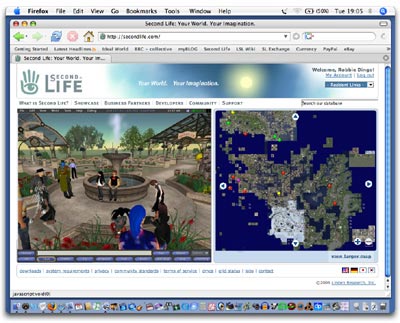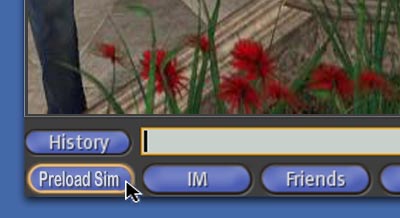As a World turns
Much has already been written about the potential for SL (Second Life) to become the mainstream front-end for a more three dimensional web experience. Judging recent actions taken by LL (Linden Lab), the move to open and free registration for example, along with the increase in SLurl links appearing on traditional websites and blogs; this feels like the general direction things are moving.
If we need any more evidence, the word on the street is that if the population of SL continues to grow and if the immigrants continue to settle, laying down roots in the form of virtual land acquisitions, eventually LL will most likely need to extend the Grid beyond which they could personally manage, allowing residents to host their own land on 3rd party or personal servers. When you take a few steps back to look at the BIG picture, this almost seems inevitable, and if LL doesn't someone else probably will, right?
So let's roll with this for a while, not looking at the fine detail but speculating and, using what we know about historical developments with regard to web trends, lets see where this might go, assuming of course that LL retains its advantage over future competition.
First, maybe it kicks off when the population reaches 1 million? (...and they laughed at Noah too). Maybe it takes a major outlet store who wants a piece of that action to come forwards and they negotiate a deal with LL to host a
Sim of their own. Seeing an additional opportunity here they also begin to rent land to their customers; and overtime the ownership of the Grid enters the public domain. Initially 3rd parties continue to offer hosting of SL Sims perhaps, but increased competition, advertising and sponsorship lower monthly rental fees and eventually, just as we have seen with website/blog/video-blog hosting etc., it becomes possible to obtain free Sim-space or to run ones own personal SL server.
(LL adopt a different payment model at this time, possibly one where charges are required to update the Client or through licensing of dedicated Server software?)
The Second Life village/town/country/continent/world, (whatever), becomes big... very big. SL worlds are arranged or naturally migrate into (solar) systems, polarizing around individual themes.

Next, the Client software is absorbed into a browser, (or if at this point LL wanted to be really shrewd, it's the other way around). Either way the 'net' result (excuse the play there) is that browsing the web whilst switching between 2- and 3-D views becomes common place, and hassle free.
Great, so everyone has a huge and open playground, what about content?
 There are many analogies that can be draw between the traditional 2-D website model and a 3-D virtual world such as SL, the language is different but some of the concepts are similar: (Internet /Grid; Website/Parcel; URL/Land- mark; Hits/ Dwell or Traffic; Hyper- Link/ Teleport; etc). However the sociable and freely creative side to SL make for distinct differences (the browser/viewer being at any moment a chat room and also the tool for content creation).
There are many analogies that can be draw between the traditional 2-D website model and a 3-D virtual world such as SL, the language is different but some of the concepts are similar: (Internet /Grid; Website/Parcel; URL/Land- mark; Hits/ Dwell or Traffic; Hyper- Link/ Teleport; etc). However the sociable and freely creative side to SL make for distinct differences (the browser/viewer being at any moment a chat room and also the tool for content creation).
Yet putting my inventing and chatting time aside, when I log to explore, the experience of flying over other people's land is like randomized web-surfing. The point I am trying to make is that unlike it's 2-D counterpart I do not currently see SL as an information resource nor do I see an effort to place 'portals' between locations which share a logical relationship - (read Hyperlinks between Web-Pages). The latter is a real shame for me.
However the true currency of SL is its content.
Currently the popularity of one location over another largely comes down to the skill and inventiveness of its Builder. Also at the moment all residents have access to the same compliment of building and scripting tools therefore everyone is able to realize builds of the same standard, at least theoretically. However, if the code for SL were to be open-sourced as occasionally hinted by LL, or if the systems were made modular so that additional plug-ins could be enabled, then we might see an un-leveling of the playing field. This could bring about healthy competition amongst major players and would certainly help to raise the bar when setting standards in quality with respect to builds and more importantly technological innovation.

Open sourcing the code would also allow for greater flexibility and versatility in the application of this technology. However the 'monopoly' assumed above (and I never really gave the make-up of that word much thought 'till now), I mean this large scale adoption of a single system without rival seems unlikely. Alternative, or spin-off systems may well come about, and there are a lot of decisions that LL will need to consider when they do.
In any case, at this time in our theoretical journey the typical reasons currently put forwards by people who do not initially enjoy the SL experience have been addressed through regular updates to the client. For example, the GUI has been made more accessible or has become a HUD - part of the user-content created by the owner of the Sim?; and an optional mode has been provided whereby all the content from a particular Sim could preloaded and cached to let it run more or less entirely on the client - in this option only active scripts and chat are streamed providing an alternative for people who are looking for a more game-based or non-lagy experience.

I wonder?
If we need any more evidence, the word on the street is that if the population of SL continues to grow and if the immigrants continue to settle, laying down roots in the form of virtual land acquisitions, eventually LL will most likely need to extend the Grid beyond which they could personally manage, allowing residents to host their own land on 3rd party or personal servers. When you take a few steps back to look at the BIG picture, this almost seems inevitable, and if LL doesn't someone else probably will, right?
So let's roll with this for a while, not looking at the fine detail but speculating and, using what we know about historical developments with regard to web trends, lets see where this might go, assuming of course that LL retains its advantage over future competition.
First, maybe it kicks off when the population reaches 1 million? (...and they laughed at Noah too). Maybe it takes a major outlet store who wants a piece of that action to come forwards and they negotiate a deal with LL to host a
Sim of their own. Seeing an additional opportunity here they also begin to rent land to their customers; and overtime the ownership of the Grid enters the public domain. Initially 3rd parties continue to offer hosting of SL Sims perhaps, but increased competition, advertising and sponsorship lower monthly rental fees and eventually, just as we have seen with website/blog/video-blog hosting etc., it becomes possible to obtain free Sim-space or to run ones own personal SL server.
(LL adopt a different payment model at this time, possibly one where charges are required to update the Client or through licensing of dedicated Server software?)
The Second Life village/town/country/continent/world, (whatever), becomes big... very big. SL worlds are arranged or naturally migrate into (solar) systems, polarizing around individual themes.

Next, the Client software is absorbed into a browser, (or if at this point LL wanted to be really shrewd, it's the other way around). Either way the 'net' result (excuse the play there) is that browsing the web whilst switching between 2- and 3-D views becomes common place, and hassle free.
Great, so everyone has a huge and open playground, what about content?
 There are many analogies that can be draw between the traditional 2-D website model and a 3-D virtual world such as SL, the language is different but some of the concepts are similar: (Internet /Grid; Website/Parcel; URL/Land- mark; Hits/ Dwell or Traffic; Hyper- Link/ Teleport; etc). However the sociable and freely creative side to SL make for distinct differences (the browser/viewer being at any moment a chat room and also the tool for content creation).
There are many analogies that can be draw between the traditional 2-D website model and a 3-D virtual world such as SL, the language is different but some of the concepts are similar: (Internet /Grid; Website/Parcel; URL/Land- mark; Hits/ Dwell or Traffic; Hyper- Link/ Teleport; etc). However the sociable and freely creative side to SL make for distinct differences (the browser/viewer being at any moment a chat room and also the tool for content creation). Yet putting my inventing and chatting time aside, when I log to explore, the experience of flying over other people's land is like randomized web-surfing. The point I am trying to make is that unlike it's 2-D counterpart I do not currently see SL as an information resource nor do I see an effort to place 'portals' between locations which share a logical relationship - (read Hyperlinks between Web-Pages). The latter is a real shame for me.
However the true currency of SL is its content.
Currently the popularity of one location over another largely comes down to the skill and inventiveness of its Builder. Also at the moment all residents have access to the same compliment of building and scripting tools therefore everyone is able to realize builds of the same standard, at least theoretically. However, if the code for SL were to be open-sourced as occasionally hinted by LL, or if the systems were made modular so that additional plug-ins could be enabled, then we might see an un-leveling of the playing field. This could bring about healthy competition amongst major players and would certainly help to raise the bar when setting standards in quality with respect to builds and more importantly technological innovation.

Open sourcing the code would also allow for greater flexibility and versatility in the application of this technology. However the 'monopoly' assumed above (and I never really gave the make-up of that word much thought 'till now), I mean this large scale adoption of a single system without rival seems unlikely. Alternative, or spin-off systems may well come about, and there are a lot of decisions that LL will need to consider when they do.
In any case, at this time in our theoretical journey the typical reasons currently put forwards by people who do not initially enjoy the SL experience have been addressed through regular updates to the client. For example, the GUI has been made more accessible or has become a HUD - part of the user-content created by the owner of the Sim?; and an optional mode has been provided whereby all the content from a particular Sim could preloaded and cached to let it run more or less entirely on the client - in this option only active scripts and chat are streamed providing an alternative for people who are looking for a more game-based or non-lagy experience.

I wonder?

1 Comments:
open source servers are the future, the reason alot of creative and talented people have not been successful in SL is because the have no space. Space in linden labs servers are pricey. When people gain the ability to host there own space you will see the metaverse grow.
Post a Comment
<< Home